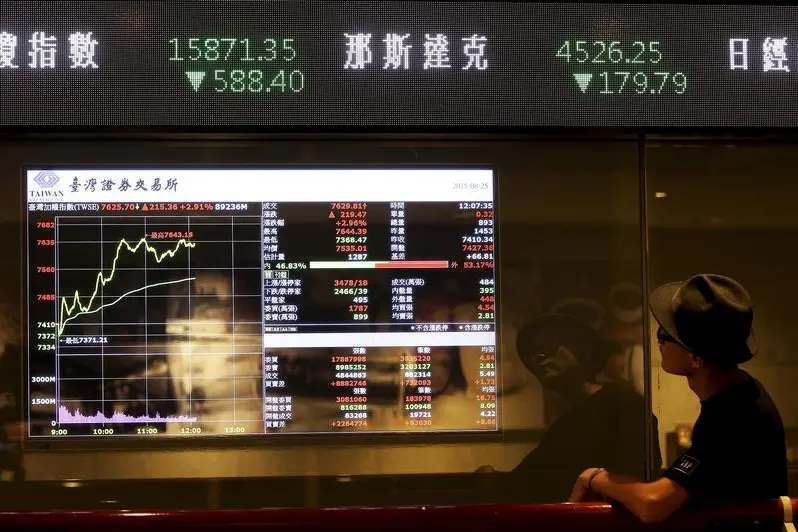PHOTO
Stocks in Taiwan logged another record high and South Korean shares were at their highest level since May 2022 on Friday as AI chipmaker Nvidia's results drove a global tech rally, while inflation in Singapore and Malaysia came in lower than expected.
Equities in Taiwan rose as much as 0.9% and South Korean stocks gained as much as 1.2% after Nvidia, on Wednesday, forecast a roughly three-fold jump in first-quarter revenue on strong demand for its AI chips.
Malaysian stocks were 0.2% higher after the country's consumer price index rose less than expected in January.
The inflation trend in Singapore was similar, with the key consumer price gauge rising lower than economists' forecasts, but remaining sticky amid slowing economic growth.
However, Singapore shares dropped 1.4%, dragged by a 10.2% drop in casino firm Genting Singapore after its quarterly results took a hit on higher-than-expected depreciation.
The easing trend in some Asian inflation prints has given Asian central banks some breathing room, but the focus of investors remains on the timing of rate cuts.
Earlier this week, the central banks of Indonesia and South Korea left their policy rates unchanged and Bank Indonesia reiterated that it would likely have room to cut rates in the second half of the year.
However, "the recent run of stronger-than-anticipated (U.S.) data threatens to delay rate cuts in the U.S., which could impact Asian policymakers’ decisions," said analysts at ANZ in a note.
"The ability and willingness of Asian central banks to pivot ahead of the U.S. Fed will depend on their external positions and the domestic pressure for cuts," they added.
Currencies in the region were marginally lower and headed for weekly declines.
The Taiwan dollar weakened 0.1% and was on track for its biggest weekly fall since the week of Jan. 19, while the Malaysian ringgit lost 0.1% and was set to lose 0.4% for the week.
The Malaysian ringgit hit a 26-year-low on Tuesday and has been hovering near it since then.
The currency's plunge during the 1998 Asian financial crisis led to then-Prime Minister Mahathir Mohamad pegging the currency at 3.8 to the dollar, and the peg stayed until 2005.
The country's current Prime Minister, Anwar Ibrahim, said the currency's fall this week was concerning but a comprehensive view of the situation must be taken into account.
Key data releases for next week include mainland China’s February PMI and India’s fourth-quarter
GDP. HIGHLIGHTS:
** Thai Jan exports rise for sixth straight month, up 10% annually
** Philippines watching U.S. presidential race closely, seeks stronger ties, envoy says
** China's new home prices extend declines despite policy support
(Reporting by Ayushman Ojha in Bengaluru; Editing by Muralikumar Anantharaman and Janane Venkatraman)




















